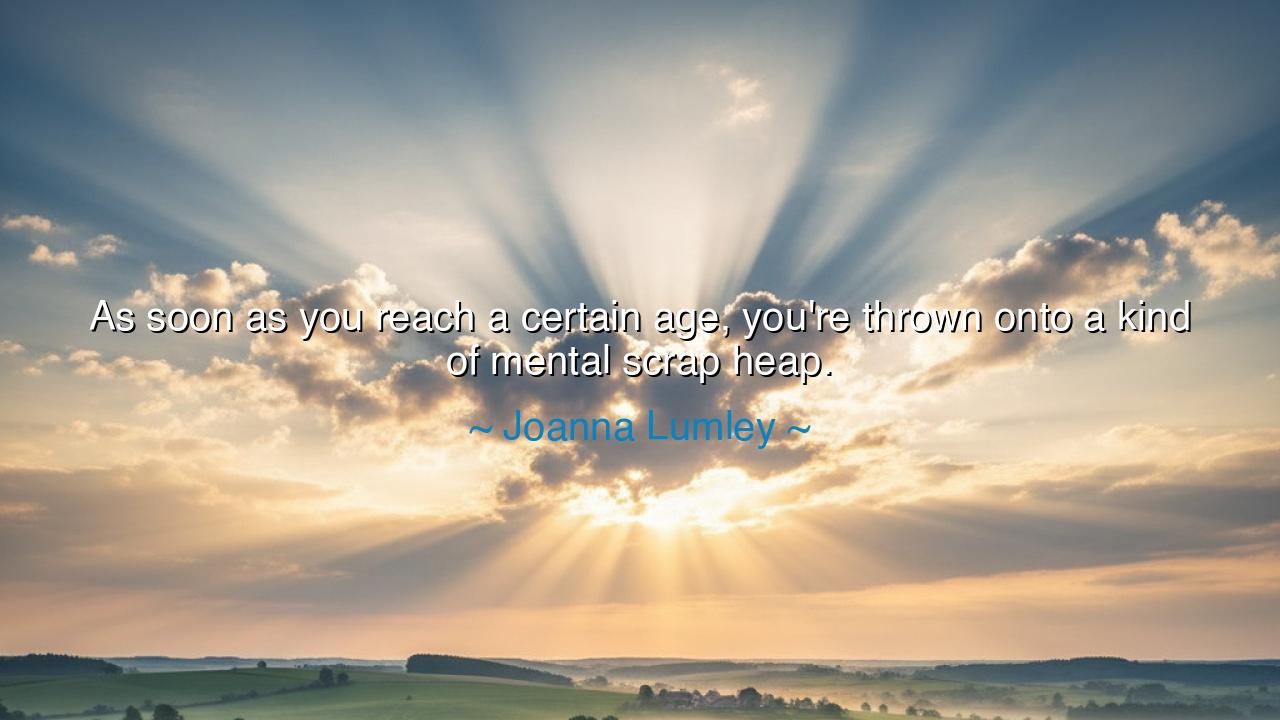
As soon as you reach a certain age, you're thrown onto a kind of






When Joanna Lumley, the graceful actress and timeless icon of wit and courage, said, “As soon as you reach a certain age, you’re thrown onto a kind of mental scrap heap,” she spoke not merely of her own world, but of an ancient injustice that persists even in modern times — the dismissal of age, the quiet exile of wisdom. Her words rise like a lament against a culture that worships the new while neglecting the enduring, that praises youth’s brilliance but turns away from the light of experience. In her voice echoes the sorrow of all those who have lived long enough to see their wisdom ignored, their relevance questioned, their place in the world denied.
This quote was born not from bitterness, but from clarity — the clarity of one who has watched society measure worth by youth’s speed rather than the soul’s depth. In an age obsessed with novelty, many forget that the mind, like fine wine or tempered steel, grows richer with time. Lumley, who herself continues to shine long after the world might have deemed her “past her prime,” names a truth few dare to speak: that the world often casts away its elders, not because they have lost their power, but because it no longer knows how to recognize true power when it comes quietly, wrapped in wisdom rather than youth.
The “mental scrap heap” she describes is not a literal place, but a condition of the modern soul — a collective blindness that fails to honor the elders among us. Once, in the ancient societies, age was revered as the crown of life. The gray-haired were not forgotten; they were seated at the center of the council, sought for counsel, and listened to with reverence. The tribe did not survive by speed alone but by memory — by the knowledge carried in those who had lived and seen. To be old was to be indispensable. But in our present age, so swift and restless, we prize innovation over wisdom, and in doing so, we lose the continuity that once bound generations together like the roots of a great tree.
Consider the fate of Sophocles, the great playwright of Athens. In his old age, his sons attempted to strip him of his rights, claiming he was senile and unfit to manage his affairs. Rather than argue, the old poet read aloud to the court his newly written tragedy, Oedipus at Colonus — a work so profound and beautiful that his accusers were silenced. In that moment, he proved that the mind of the aged is not a ruin, but a temple — one filled with echoes of wisdom that only time can teach. Lumley’s lament finds its reflection here: the world often mistakes calmness for weakness, experience for exhaustion, and forgets that the spirit does not age as the body does.
Yet, her words are not without hope. For in naming this injustice, Lumley also awakens awareness. She reminds us that while society may try to discard its elders, those elders must refuse to discard themselves. The mind that has lived, learned, and endured has a duty — not to yield to invisibility, but to speak, to create, to share what it knows. In this sense, her quote is both a warning and a call to arms: to reject the “scrap heap,” to rise above it, and to continue shining with the inner fire that no clock can extinguish. For dignity is not given by others; it is claimed by the spirit that refuses to fade.
And what of the young? The lesson belongs to them as well. For the time will come when their own hair will gray, and the world, if unchanged, will turn its back on them as well. Let them, therefore, learn now to honor age, to seek the counsel of those who came before, to understand that wisdom is the inheritance of all humanity. The society that forgets its elders forgets its own story — it becomes a civilization without roots, destined to topple in the first great storm.
So, O listener, remember this teaching: age is not a burden but a blessing. Do not let the world convince you otherwise. Whether young or old, hold sacred the power of experience, and honor those who carry it. Seek their words, their memories, their hard-won truths. And if you, yourself, are entering the later seasons of life, stand tall. Refuse the silence the world imposes. Speak, create, teach, and know that your mind is still a living flame.
Thus, the teaching endures: wisdom never grows obsolete. The “mental scrap heap” exists only in the minds of those who cannot see the value of what endures. As Joanna Lumley reminds us, the measure of one’s worth is not in years but in insight, not in beauty but in brilliance of being. The world may turn away from the aged — but the wise, like the stars, continue to shine long after the sun has set.






AAdministratorAdministrator
Welcome, honored guests. Please leave a comment, we will respond soon